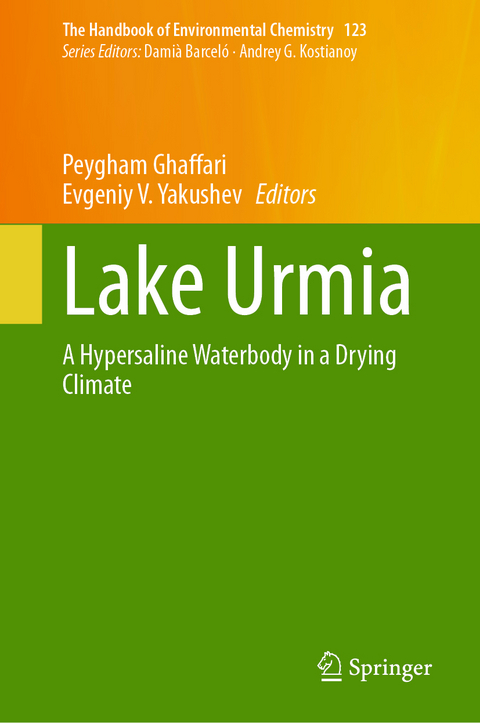
Lake Urmia
Springer International Publishing (Verlag)
978-3-031-41052-9 (ISBN)
This book provides a holistic review of the environmental status of Lake Urmia in terms of its hydrodynamic, chemical, and ecological properties. Lake Urmia is a shallow landlocked hypersaline water body located in the northwest part of Iran, and it is known as one of the largest continental salt lakes in the world. Divided into 16 chapters, the book gathers leading experts from various scientific disciplines, and it covers past and current characteristics of the lake and traces projections on how the water quantity, quality, chemical, and ecological state of Lake Urmia Basin can develop in the future. The book outcomes are based on the analyses of the data of observations and unique models that were elaborated for the Lake Urmia system development studies. Particular attention is given to the basin drought in response to anthropogenic drivers and environmental pressures such as climate variability and climate change and their impact on the aquatic environment. The impact of water conveyance on Lake Urmia to improve the physical, chemical, and biological natural state is also discussed in this book, where an intensive and challenging observation plan in this harsh environment is combined with uniquely coupled and adopted hydrodynamical-biogeochemical models. Given its scope, the book offers an invaluable source of information for researchers, students, and environmental managers interested in the Lake Urmia environment.
Peygham Ghaffari has a Ph.D. in Dynamical Oceanography from Oslo University and is a senior researcher at the Norwegian research company Akvaplan-niva. He has 20 years of experience in developing, managing, and conducting local, regional, and international research and capacity-building projects. His primary scientific focus is on mass/energy transport and dispersion of physical, chemical, and biological components and attributed environmental impacts, particularly in the marginal and inland seas. His work includes project development and implementation of advanced scientific models and simulations serving oil and gas, petrochemical, deep-sea mining, as well as emerging green platform industries. He is an inland waterbody and marginal seas expert, e.g., the Caspian Sea.
Evgeniy Yakushev has worked as a senior researcher in the Section for Oceanography of the Norwegian Institute for Water Research since 2007. He graduated from Moscow State University in 1979 and received a Ph.D. degree in oceanography and a Doctor of Sciences degree in oceanography in 2002. He has a long experience in chemical oceanography and biogeochemical modeling. This work includes implementing field and modeling techniques for investigations of biogeochemical cycles, and chemical and biological processes that affect nutrients (C, N, O, P, S), with special emphasis on oxygen deficiency in the aquatic environment. During the last few years, he has worked on projects connected with ocean acidification, lake salinization, water contamination with heavy metals, organic pollutants, fish farm wastes, microplastics, and marine litter. He also studied the climate change effects on the Arctic Ocean biogeochemistry.
Introduction: Lake Urmia - A Hypersaline Waterbody in a Drying Climate.- Seasonal Variation of Evaporation from Hypersaline Basin of the Urmia Lake.- Sediment distribution pattern in Lake Urmia.- The Vanishing of Urmia Lake: A Geolimnological Perspective on the Hydrological Imbalance of the World's Second Largest Hypersaline Lake.- Modelling Biogeochemical and Physicochemical Regime Changes During the Drying Period of Lake Urmia.- A Review of Tectonics and Seismotectonics of Urmia Lake, NW Iran.- Local Changes in Meteorological Parameters Caused by Desiccation of the Lake Urmia.- Analysis of the Long-Term Trend of Temperature, Precipitation, and Dominant Atmospheric Phenomena in Lake Urmia.- Hydroclimate of the Lake Urmia Catchment Area: A Brief Overview.- Global and Regional Signals in the Water Level Variation in hypersaline Basin of the Lake Urmia.- Comparative Study of the Major Ion Composition in Eurasian Salt Lakes: Lake Urmia, Lake Issyk-Kul, Aral Sea, and Dead Sea.- Hydro-Meteorological Observations in Hypersaline Basin of Lake Urmia.- Lake Urmia Brine Evolution from 2007 to 2019.- Salt load impact on Lake Urmia basin volume.- How Climate Change and Human Interaction Alter Chemical Regime in Salt Lakes, Case Study: Lake Urmia, Aral Sea, the Dead Sea, and Lake Issyk-Kul.- Modelling Physical and Chemical Processes of the Hypersaline Lake Urmia: Water Level Decline and Restoration by Water Conveyance.- Conclusion.
| Erscheinungsdatum | 23.09.2023 |
|---|---|
| Reihe/Serie | The Handbook of Environmental Chemistry |
| Zusatzinfo | XII, 330 p. 60 illus., 30 illus. in color. With online files/update. |
| Verlagsort | Cham |
| Sprache | englisch |
| Maße | 155 x 235 mm |
| Gewicht | 698 g |
| Themenwelt | Sachbuch/Ratgeber ► Natur / Technik ► Natur / Ökologie |
| Naturwissenschaften ► Chemie ► Technische Chemie | |
| Schlagworte | Artemia urmiana • Biogeochemical modelling • Hypersaline aquatic ecosystem • Hypersaline basin • Salt deposition mechanism • Water Management |
| ISBN-10 | 3-031-41052-1 / 3031410521 |
| ISBN-13 | 978-3-031-41052-9 / 9783031410529 |
| Zustand | Neuware |
| Informationen gemäß Produktsicherheitsverordnung (GPSR) | |
| Haben Sie eine Frage zum Produkt? |
aus dem Bereich


